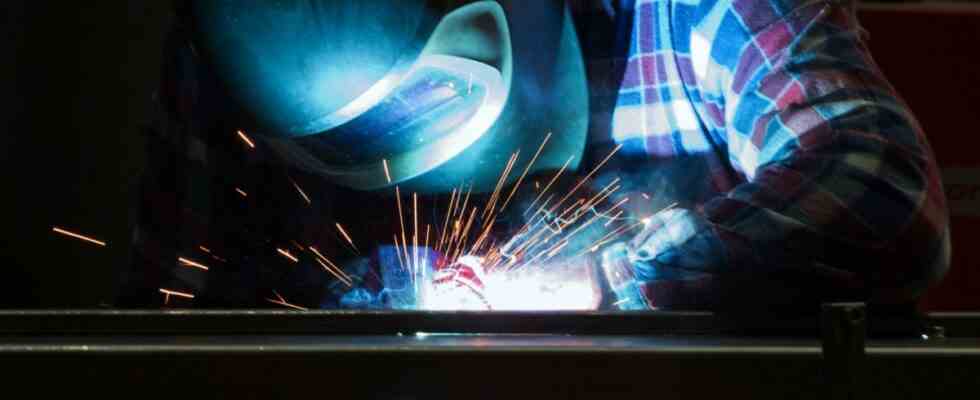Jörg Hofmann comes straight to the dramatic terms that shaped the past year. The IG Metall boss is talking about the energy crisis, about record inflation and apocalyptic warnings. Lots of actors are talking about that. That’s why Hofmann’s term, which gets the most attention in the traditional annual talk, is a very undramatic one: tinsel. Tinsel?
The glittering Christmas decorations have been deeply rooted in German cultural history ever since the satirist Loriot had Grandpa Hoppenstedt shuffling across the television screen in 1978. The nagging grandpa dislikes modern times. He expresses this at the family Christmas party by repeating the same sentence: “There used to be more tinsel!”
Why Obermetaller Hofmann mentions the Christmas decorations is quite significant for the future of Germany’s largest trade union. Hofmann thus confirms a report by Süddeutsche Zeitung, according to which there should also be a formally equal dual leadership as soon as he resigns in the fall. For this, however, the statutes would have to be changed, which previously provided for a first and second chairman. Old-fashioned, cumbersome titles that indicate hierarchy in union reality. “There are considerations to delete the tinsel from the statutes,” says Hofmann. Then the way would be clear for the aspirants Christiane Benner and Roman Zitzelsberger: The previous deputy chairwoman and the Baden-Württemberg district manager could form an equal team. A power struggle between them for the top position like that between Jürgen Peters and Berthold Huber, which paralyzed IG Metall 20 years ago, would have been avoided.
Christiane Brenner could become chairwoman of IG Metall, in a dual leadership.
(Photo: Friedrich Bungert)
Maybe Benner and Zitzelsberger will say something like: “There used to be more tinsel!” However, it is by no means certain whether this will actually happen. Not only Grandpa Hoppenstedt loves glitter jewelry. Some influential metalheads are also opposed to cleaning the articles of association of tinsel, for which a two-thirds majority is required at the trade union congress in October. For example, because it might look as if Christiane Benner isn’t capable of being the first woman to head the union alone. In addition, as a result of the change in the articles of association, the executive board is to be reduced from seven to five members in order to become more effective. Such a plan failed in 2011. For many trade unionists it was important that as many regions and political camps as possible be represented on the board.
Roman Zitzelsberger is the Baden-Württemberg district manager of the union.
(Photo: Christoph Schmidt/dpa)
The energy transition as a survival strategy
It will be decided in March whether the amendment to the statutes will be proposed to the trade union congress. If the plan falls flat, a rivalry between Benner and Zitzelsberger could break out. Officially, there are no candidates at all. Jörg Hofmann only wants to propose names in the summer. Christiane Benner, who is sitting next to him, makes it as clear as a not-yet-candidate that she wants the job: “Of course I’m ready to take on more management responsibility.”
Hofmann would like to leave the sensitive topic as quickly as possible and turns his attention to politics. Germany must become the lead market for a successful energy and mobility transition if it wants to retain its prosperity. “Are we going late? Yes, but not too late.” Hofmann points out that 17,000 public charging points for electric cars were added last year, although at least 130,000 a year are needed to reach the goal of one million by 2030. The deficit in renewable energies is just as dramatic. The industry needs cheap green electricity with a price brake so that no companies migrate: “In the energy-intensive industries, jobs are endangered on a massive scale.”
IG Metall also wants to tackle the labor shortage. So Benner announced a campaign for more apprenticeships. Even those who have missed the usual moment for vocational training should not fall through the cracks: “2.3 million citizens between the ages of 20 and 34 are without training. How can that be?” In addition, the government should spend more money to enable retraining: from mechanics to heating installers, for example. Or from engine developer to software developer.
Like other unions, IG Metall is fighting for its influence. In 2022, the number of members fell by one percent to 2.15 million, also due to deaths. However, it was mainly thanks to the collective bargaining round that 120,000 new members were recruited, the highest number in a long time. Among them were a particularly large number of employees, especially engineers. What they think of tinsel has not been researched.

